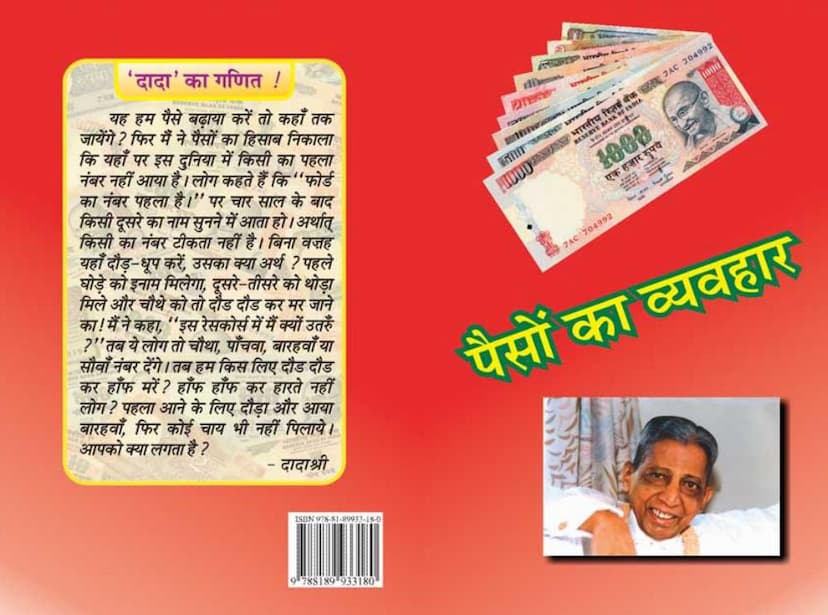Paiso Ka Vyvahaar
Added to library: September 2, 2025

Summary
Here's a comprehensive summary of the Jain text "Paiso Ka Vyavahaar" by Dada Bhagwan, based on the provided pages:
The book "Paiso Ka Vyavahaar" (The Way of Handling Money) by Dada Bhagwan, published by Mahavideh Foundation, delves into the spiritual and practical aspects of dealing with wealth from a Jain perspective. The core message revolves around understanding money not as an end in itself, but as a product of karma and a tool that should be managed with detachment and righteousness.
Key Themes and Teachings:
- Money as a By-product of Karma: Dada Bhagwan emphasizes that wealth is not primarily earned through hard work or intelligence alone, but is a result of past karmas (punya). Those who have accumulated punya will naturally attract wealth, while those who haven't, even with immense effort, will not. Conversely, loss is also a consequence of karma.
- Detachment from Wealth: A central teaching is to remain detached from money. While acknowledging its necessity for worldly transactions, the emphasis is on not becoming attached or engrossed in its accumulation or preservation. Attachment leads to worry, anxiety, and ultimately suffering.
- The Nature of Money: Money is described as inherently transient and "chanchal" (fickle). It comes and goes, and the constant chase for it often leads to negative emotions like greed, worry, and deceit. The book highlights that even vast fortunes do not guarantee happiness or satisfaction.
- Righteous Earning and Spending: The text strongly advocates for honesty and integrity in all financial dealings. Earning money through deceit, black market practices, or by exploiting others is condemned as "haram ki Lakshmi" (ill-gotten wealth) which leads to negative consequences, including lower birth forms in future lives. Similarly, spending should be judicious and for righteous purposes.
- The Importance of "Niti" (Ethics/Integrity): Dada Bhagwan stresses that while earning money is often a necessity in life, maintaining ethical conduct ("niti") in the process is paramount. Even if it means earning less or incurring a loss, remaining truthful and honest in business dealings is crucial for spiritual progress and inner peace.
- "Ghaata" (Loss) and "Munafa" (Profit) as Karma: The book presents both profit and loss in business as natural consequences of karma. A wise person remains equanimous in both situations, without excessive joy in profit or dejection in loss. The focus should be on the effort and intention, not just the outcome.
- "Santosh" (Contentment) as the True Wealth: True wealth is not measured by the amount of money one possesses, but by the level of contentment and inner peace one experiences. Contentment arises from understanding the nature of karma and remaining detached from material possessions.
- Spiritual Path Amidst Worldly Life: The teachings are practical for householders. Dada Bhagwan advocates for maintaining one's worldly responsibilities while simultaneously striving for spiritual liberation. The key is to perform actions without attachment and with a pure intention.
- The Role of "Pratikraman" (Self-Correction): When one realizes a mistake in financial dealings or harboring negative thoughts about money or people related to it, sincere repentance and self-correction ("pratikraman") are essential to neutralize the karmic repercussions.
- The Dangers of Greed ("Lobh"): Greed is identified as a major impediment to spiritual progress and a cause of suffering. It leads to deceit, anxiety, and ultimately, a lower birth. The book advises to be "kifayat" (frugal/economical) rather than "kanjoos" (miserly) or "lobhi" (greedy).
- The Nature of Giving and Receiving: Giving with a pure heart and without expectation is praised. The book distinguishes between giving from one's own earnings and giving what was not rightfully earned. True generosity is a sign of spiritual progress, while clinging to wealth is a sign of attachment and ignorance.
- "Vastutvikta" (Reality): Understanding the true nature of things – that possessions are impermanent and true happiness lies within – is crucial. The constant pursuit of worldly gains without this understanding is likened to trying to fill a bottomless pit.
- The Principle of "Bhogve Uski Bhool" (Sufferer's Fault): This fundamental Jain principle is applied to financial matters. If one suffers a loss or is cheated, it is due to one's own past karma or mistakes, not solely the fault of the other person. This understanding helps in releasing anger and resentment.
- The Goal of Moksha: Ultimately, the teachings guide individuals towards realizing their true Self (Soul) and achieving liberation (moksha). Worldly wealth, if managed with detachment and righteousness, can be a supportive element in this journey, but it should never become the primary focus.
In essence, "Paiso Ka Vyvahaar" offers a profound perspective on money, urging readers to see it as a worldly transaction governed by karmic laws, and to manage it with integrity, detachment, and an ultimate focus on spiritual well-being. It emphasizes that true richness lies not in accumulation but in contentment and righteous living.